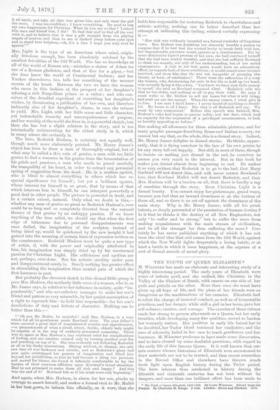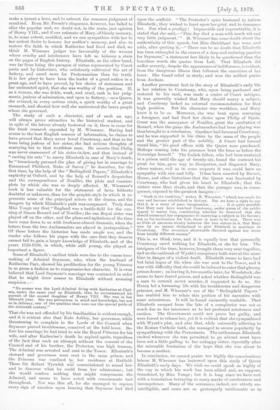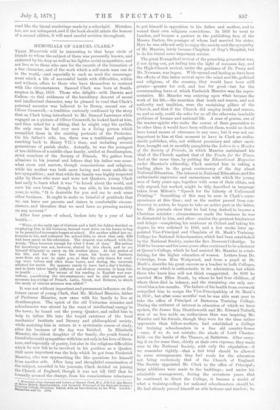THE YOUTH OP QUEEN ELIZABETH.*
M. WIESENER has made an elaborate and interesting study of a highly interesting period. The early years of Elizabeth were years of infinite peril, and she walked, like Christian in the Valley of the Shadow of Death, with snares on one side of her path and pitfalls on the other. More than once she must have given up all hope of life, and the plots of her friends were- as dangerous as the machinations of her enemies. Elizabeth had to rebut the charge of immoral conduct, as well as of treasonable, practices, and her danger, while still a girl in her teens, gave her self-reliance, caution, and courage. The exercise of these virtues made her strong to govern afterwards as a Queen, but her early troubles, while developing many fine qualities, served to harden her womanly nature. Her position in early life forced her to be deceitful, her Tudor blood rendered her vindictive, and the uses of adversity failed in her case to teach gentleness and for- bearance. M. Wiesener professes to have made some discoveries, and to have cleared up some doubtful questions, with regard to the early life of this famous Queen. It is well known that cer- tain sources whence historians of Elizabeth were accustomed to draw materials are not to be trusted, and that recent researches in the Record Office and elsewhere have thrown much fresh light upon English history during the Tudor period. The keen. interest thus awakened in history during the fifteenth and sixteenth centuries has not been without its dangers, and more than one brilliant effort has been made to.
• The Youth of Queen Elizabeth, 1693.1558. By Louie Wiesner. Edited from the French. By Charlotte ti. Unice. 2 rola. London: Hunt and Blaokett. 1819.
make a tyrant a hero, and to subvert the common judgment of mankind. Even Mr. Froude's eloquence, however, has failed to alter the popular and, we doubt not, in the main, just opinion of Henry VIII., and if our estimate of Mary, of bloody memory, is, to some extent, modified, and we can sympathise with her in her ardent desire to honour her mother's memory, and also to restore the faith in which Katherine had lived and died, we think M. Wiesener judges too favourably of the woman whose cruelty and intolerance have left so hideous a stain on the pages of English history. Elizabeth, on the other hand, was far from being the paragon of virtue represented. by Court poets and by historians, who sedulously cultivated. the art of flattery, and cared more for Protestantism than for truth.
It is her glory to have been the leader of a great nation in a great age, and to have proved, by her choice of statesmen and her undaunted spirit, that she was worthy of the position. If, as a woman, sho was fickle, weak, and cruel, rash in her judg- ments, jealous of admiration, and open to flattery,—as a Queen, she evinced, in every serious crisis, a spirit worthy of a great
monarch, and showed how well Flo understood the brave people whom she governed.
The study of such a character, and of such an age, will always prove attractive to the historical student, and in spite of the labour already bestowed on it, there is room for the fresh research expended by M. Wiesener. Having had access to the best English sources of information, he claims to have proved that Mary never loved Courtenay, and that so far from being jealous of her sister, she had serious thoughts of marrying her to that worthless man. He asserts that Philip was never enamoured of his sister-in-law, and that instead. of " casting his nets " to marry Elizabeth in case of Mary's death, ho " tenaciously pursued the plan of giving her in marriage to Emmanuel Philibert, Duke of Savoy ;" he describes, for tho first time, by the help of the " Bedingfield Papers," Elizabeth's captivity at Oxford, and by the help of Renard's despatches and the correspondence of Noailles, the plots and counter- plots by which she was so deeply affected. M. Wiesener's book is less valuable for the statement of facts hitherto doubtful or unknown, than for the graphic style in which it re- presents some of the principal actors in the drama, and the dangers by which Elizabeth's path was compassed. Truly does Miss Yonge say that " England was a battle-field for the cun- ning of Simon Renard and of Noailles ; the one Royal sister was played off on the other, and the plans and agitations of the time have come down to us with freshness almost dramatic, when the letters from the two Ambassadors are placed in juxtaposition." Of these letters the historian has made ample use, and the reader who follows his pages with the care that they deserve cannot fail to gain a larger knowledge of Elizabeth, and of the years 1533-1558, in which, while still young, she played so important a figure.
Some of Elizabeth's earliest trials were due to the coarse love- making of Admiral Seymour, who, when the husband of Katherine Parr, showed his predilection for the young Princess in so gross a fashion as to compromise her character. It is even believed that Lord Seymour's marriage was contracted in order that he might draw nearer to Elizabeth without arousing suspicion
"No sooner was the Lord-Admiral living with Katherine at Chel- sea, under the same roof as Elizabeth, than he recommenced his pursuit of the second daughter of Henry VIII. She was in her fifteenth year. She was precocious in mind and knowledge, but not so in delicacy, one of the qualities that were not the special pride of the sixteenth century."
That she was not offended by his familiarities is evident enough, and it is evident also that Kate Ashley, her governess, while threatening to complain to the Lords of the Council when Seymour proved troublesome, connived at the bold lover. Be- fore his marriage he had tried to win the Royal Princess for his
wife, and after Katherine's death he aspired again, regardless of the fact that such an attempt, without the consent of the Council and of his brother, the Protector, was high treason. The Admiral was arrested and sent to the Tower. Elizabeth's steward and governess were sent to the same prison, and the Princess was confined to her residence at Hatfield. There Sir Robert Tyrwhit was commissioned to sound her, and to discover what he could from her admissions ; but she would confess nothing that might compromise the Admiral, and seems to have acted. with consummate tact throughout. Nor was this all, for she managed to repress every sign of emotion upon hearing that Seymour had died
upon the scaffold. " The Protector's spies hastened to inform Elizabeth ; they wished to feast upon her grief, and to denounce her. But what a prodigy ! Impassable and impenetrable, it is stated that she said,—` fhis day died a man with much wit and very little judgment.' " M. Wiesoner has some doubt about the authenticity of this speech, but Miss Strickland. has none, and adds, after quoting it,—" There oan be no doubt that Elizabeth has been entangled. in the snares of a deep and passion for Seymour," a statement less likely to be questioned than the heartless words she quotes from Leti. That Elizabeth did suffer severely, despite the appearance of indifference, is evident, from the dangerous illness that followed. the execution of her lover. She found relief in study, and won the noblest praise from Aseham.
Another prominent fact in the story of Elizabeth's early life is her relation to Courtenay, who, upon being pardoned and restored to his rank, was made a centre of Court intrigue. It was generally wished that Mary should. marry a subject, and Courtenay lacked. no external recommendation for that high position. But his character was worthless, and Mary knew it to be so. Moreover, she was bent upon marrying a foreigner, and had fixed her choice upon Philip of Spain. Great was the annoyance of Noailles, great the exultation of Renard, when the game the Ambassadors had been playing was thus brought to a conclusion. Gardiner had favoured Courtenay, and he was supported in his claim by the mass of the people and the greater part of the nobility. A Court had formed round him, " his good. offices with the Queen were purchased. Bishops coming into his presence bent the knee as before the Sovereign herself." The foolish fellow, who had been nurtured in a prison until the age of twenty-six, found the contrast too great for him, gave way to dissipation, and disgusted Mary, whose nature, evil as in some respects it was, could have no sympathy with vice and folly. It has been asserted by Burnet, Hume, and other historians that the Queen was fascinated. by Courtenay, who had given his heart to Elizabeth ; that the sisters were thus rivals, and that the younger was, in conse- quence, exposed to the greatest dangers
:- "Such is the tradition," writes M. Wiesoner, "which has made its way and become established in history. But we have a right to say
that it is a story of pure imagination It is quite possible that Mary may have watched Courtenay, under stress of the public appeal to marry him, considering whether ho deserved that sho should surmount her repugnance to marrying a subject in his favour; but as for inclination for him, there is none to be seen. There was so little of amorous rivalry between the two sisters in it, that Mary was by no means disinclined to give Elizabeth in marriage to Courtenay. Tho severities afterwards directed against her arose from totally different causes."
This is, we think, true, and it is equally true that personally Courtenay cared nothing for Elizabeth, or she for him. The intrigues of the time, however, brought them very near together,
and on the outbreak of Wyatt's conspiracy both were at the same time in danger of a violent death. Elizabeth seems to have had
but faint hopes of life when she was sent to the Tower, and it was with difficulty that she could be induced to enter that gloomy prison-house ; on leaving it, two months later, for Woodstock, she seems to have feared poison, and asked whether Bedingfield was a man to commit secret murder, if requested to do so. Sir Henry led a harassing life with his troublesome and dangerous prisoner, and M. Wiesener's use of the " Bedingfield Papers '' has enabled ,him to relate this portion of his narrative with some minuteness. It will be found eminently readable. That Elizabeth escaped from the fate of a conspirator was not so much due to her innocence as to her profound astuteness and caution. The Government could not prove her guilty, and were forced to release her, yet it is evident that she sympathised with Wyatt's plot, and also that, while outwardly adhering to the Roman Catholic faith, she managed to secure popularity by sympathising with the Protestants. The enthusiasm Elizabeth excited whenever she was permitted. to go abroad must have been not a little galling to her unhappy sister, especially after the miserable frustation of the hope that she was about to become a mother.
In conclusion, we cannot praise too highly the conscientious labour M. Wiesener has bestowed. upon this study of Queen Elizabeth's early days. We wish we could speak as highly of the way in which his work has been edited and, we suppose, translated, by Miss Yonge ; but it is long since we have met with a translation betraying so many marks of carelessness and incompetence. Many of the sentences, indeed, are utterly un- intelligible, and some are so grotesquely unidiomatic as to read like the literal renderings made by a schoolgirl. Mistakes, too, are not infrequent, and if the book should attain the honour of a second edition, it will need careful revision throughout.




































 Previous page
Previous page